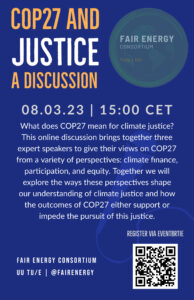Agenda
What happened at COP27?
Many thanks to our Dr Sumedha Basu, Adrian Martinez Blanco, and Rocio Garcia Garcia Naranjo for joining this consortium panel on COP 27 and justice.
Starting out with a broader overview of COP27, the panel quickly narrowed in on a range of procedural and participatory issues on the ground at the most recent COP, in Sharm el Sheikh, Egypt. Whilst panellist said there was tentative cause for celebration surrounding the establishment of a loss and damage fund, a broad range of issues were discussed which brought into question the legitimacy of international agreements and mechanisms which stem from COPs, as well as ability to these agreements to deliver meaningful, inclusive, and equitable responses to climate change.
Problems and barriers discussed ranged from a disproportionate and growing presence of fossil fuel representatives, financial barriers to participation on the ground, increasingly policed and limited space for protest and marginalised voices. A recurring theme was the limited ability to exercise or meet basic human rights within COP27, including access to water and (affordable) food.
Shaped by a number of factors, a fossil fuel centred host nation, limited women’s and political rights, the outlook for future COPs and amelioration of these issues was not promising. Yet panellists maintained that participation in future COPs, however difficult, remains a necessity.
Please contact n.a.wood@uu.nl if you would like to join the Fair Energy Consortium’s mailing list of follow us on twitter @FairConsortium.


